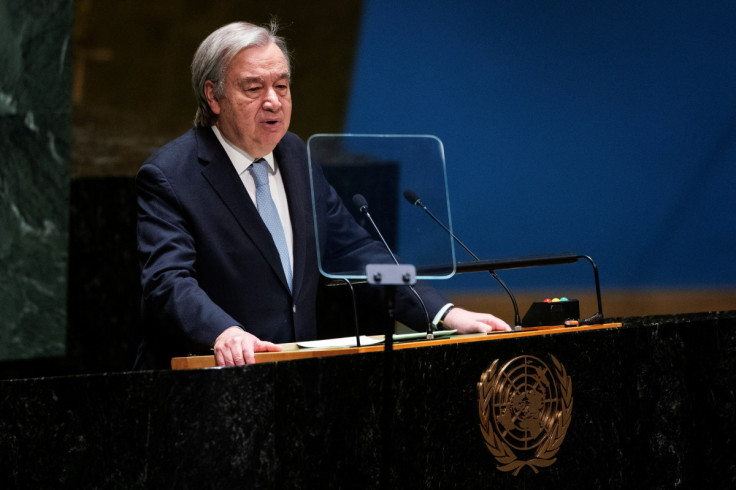U.N. Chief Condemns Taliban Ban On Afghan Women Working For U.N

U.N. chief Antonio Guterres condemned on Wednesday a ban by Afghanistan's Taliban authorities on Afghan women working for the United Nations, calling it "an intolerable violation of the most basic human rights" that should be immediately revoked.
The United Nations has told some 3,300 Afghan staff - of which about 400 are female - not to report to their offices until further notice for security reasons. Some 600 international staff in the country are not affected by the ban.
"Banning Afghan women from working with the U.N. in Afghanistan is an intolerable violation of the most basic human rights," Guterres posted on Twitter. "I call on the Taliban to immediately revoke this decision."
The U.N. Security Council is due to discuss the situation behind closed doors on Friday, diplomats said.
Taliban administration spokespeople did not respond to requests for comment. The administration, which seized power as U.S.-led forces withdrew, says it respects women's rights in line with its strict interpretation of Islamic law.
Top U.N. officials in Kabul met with the Acting Afghan Minister of Foreign Affairs Amir Khan Muttaqi on Wednesday after the Taliban authorities signaled on Tuesday that they would enforce a ban on Afghan women working for the world body.
'OUTRAGED'
Deputy U.N. envoy in Afghanistan, Ramiz Alakbarov, who is also the humanitarian aid coordinator, said Muttaqi told them the ban was an expansion of an order issued in December that stopped Afghan women from working for aid groups.
When asked if it was worth the United Nations staying to work under these restrictions, he said: "Even if it will save the life of one child, even if we will build one house, even if it will change the life of one person, it is worth it."
"The people of Afghanistan cannot be abandoned," Alakbarov told reporters in New York via video on Wednesday.
U.N. Deputy Secretary-General Amina Mohammed, who traveled to Afghanistan in January to meet with the Taliban authorities, told reporters on Wednesday that Afghan female U.N. staff would continue to be paid and would not be replaced by men.
"On a personal note, I am outraged. I am terribly troubled by the fact that in the month of Ramadan ... what we get from the Taliban is a strike against the teachings and the belief of Islam," said Mohammed.
The International Committee of the Red Cross (ICRC) said in a statement it was not yet clear if it would be impacted by the ban and that it was "worried about the catastrophic consequences" for the Afghan people of its full implementation.
Aid workers say the December ban on female employees has already made it more difficult to reach women in need and could lead donors to hold back funding.
Mohammed appealed to donors not to pull back. The U.N. has made its single-largest country aid appeal ever, asking for $4.6 billion in 2023 to deliver assistance in Afghanistan. So far it is only 5% funded and the United Nations says nearly three-quarters of the country's 40 million people need help.
"I would plead with them that this is about saving lives and livelihoods," Mohammed said.
© Copyright Thomson Reuters 2024. All rights reserved.





















